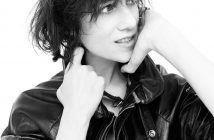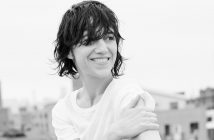By Matt Fink, Under the Radar, Feb 01, 2010
One of the very few artists who can claim to have worked with a handful of both her generation’s most acclaimed directors and musicians, with Michel Gondry and Lars von Trier rubbing elbows with Jarvis Cocker and Neil Hannon on her resume, Charlotte Gainsbourg has lived a truly charmed life. But in September of 2007, a year after the release of 5:55, the Nigel Godrich-produced, Air-assisted album that marked her return to music after 20 years as one of France’s most beloved actors, she seemed to have exhausted her good fortune. After a seemingly minor waterskiing accident, she started having headaches. An MRI revealed extensive bleeding within her brain, so severe that she would have died without immediate intervention. But even after receiving a clean bill of health, Gainsbourg felt fragile and anxious, convinced that her life was hanging by a thin thread. Eventually she found comfort and inspiration in the strangest of places—in the belly of an MRI machine.
« I think at the time, it was so traumatizing having to go through all this that it was some kind of an escape, while I was in that machine, to imagine what could be done with those kinds of sounds, » she says from the backstage at New York’s Bowery Ballroom a few hours before what would be only her third live performance. « I think the whole chaos of those beats, it’s very disturbing and aggressive, but I just thought it would be great to use those sounds. There was something very dramatic about that first MRI. Every two weeks I would ask for a new MRI because I was panicked. Yet it’s this weird feeling of people entering your body, » she says, laughing uneasily. « It’s very strange. »
After completing a recommended year off from all creative pursuits, Gainsbourg found a recording of an MRI machine and began thinking of ways to translate her experiences into a new album. Problem is, Gainsbourg isn’t a songwriter; her previous songs were penned by her late father, legendary provocateur Serge Gains-bourg, and some combination of Air, Jarvis Cocker, and Neil Hannon. Having long been an admirer of Beck-their paths crossing multiple times backstage at his shows—she knew he was the person whose consummate eclecticism could replicate the chaos she felt within. A few phone calls later, she started a year-and-a-half collaboration, flying to Los Angeles to feed Beck specific words and images before zipping back home to work on film projects.
« I wanted to be there all the time, and I didn’t want him to write stuff without me and then have me sing on the music, » she says. « Just being able to see his process and method of work was a real discovery for me. So every time I tried to write lyrics or come up with words, it was very hard for me not to be embarrassed with what I’d come up with. It was very thin in comparison to what he brought. He kept saying, ‘You just have to try, and it will come.’ So I was always trying but not very proud of what I came up with. »
What resulted was IRM, the French acronym for an MRI, a collection of understated African beats, swirling strings, and somber ballads. Capturing the desperation and isolation of a person trying to piece together a recently shattered sense of self, it’s both unflinchingly vulnerable and starkly haunted, with Beck creating a stylistic hybrid of his Mutations and Sea Change albums mashed together with Serge Gainsbourg’s sleekly string-laden ’70s releases.
« It was much later on that he would send me new arrangements, and the discovery of the pieces afterwards was always very exciting and surprising, » Gainsbourg explains. « What I was very thankful for was to be able to go to the recording of the strings, because Beck’s father [David Campbell] did the recordings of the strings of my previous album, and I had missed it. This time, I was so happy to be there, just to be able to see their collaboration. It was very touching to me, a very magical moment. »
As she’s always forthright with the fact that she’s still deeply affected by her father’s unexpected death 19 years ago after a heart attack, it makes sense that Gainsbourg would be struck by such an example of familial collaboration. But where Serge Gainsbourg never suffered from a lack of confidence over his audacious 35-year career, his daughter isn’t quite ready to take Beck’s advice and claim her own songwriting process.
« He was pushing me all the time, » Gainsbourg says. « I know that I’m completely blocked, so I don’t know if some day I will be able to unblock myself. I don’t know if it will be for the next album. And I admire other people so much that I don’t think I’m able to not judge what I’m doing lyric-wise. I hope I will one day, » she says carefully. « Maybe. »



